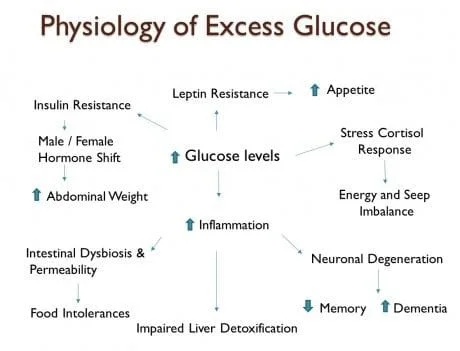Blood Sugar Instability (Dysglycemia)
Dysglycemia is a state of imbalance in the body’s ability to maintain blood sugar levels. The two extremes of dysglycemia are diabetes and hypoglycemia. Diabetes occurs as a result of consistently elevated blood glucose levels and an inability of metabolism to bring down the glucose to a normal state. Elevated glucose levels creates changes to protein in the blood inducing inflammation. These inflamed molecules create problems throughout the whole body, especially the brain, nerves, liver, pancreas, and kidneys. Hypoglycemia is a consistent state of low blood glucose and an inability to maintain enough glucose in the blood stream to feed the brain leading to anxiety, irritation and even the loss of consciousness.
Diabetes typically is caused by excessive intake of processed sugars resulting in the burn out of insulin production and the failure of our cells to respond to correctly to the signal from insulin. It is easy to see why our pancreas is so stressed when you observe the increase in sugar intake over the last 20 years.

The blood sugar mechanism is tightly regulated to prevent too much or too little sugar in the blood stream. Functional dysglycemia occurs when the body cannot regulate this level of sugar correctly and predictable symptoms start to occur. Functional dysglycemia, which leads to diabetes, can occur with either low or high blood sugar symptoms. It is strongly recommended to seek a functional assessment in the office if either occur frequently.
Low blood sugar symptoms:
- Craving for sweets
- Irritability if meals are missed
- Dependency on coffee for energy
- Slow starter in the morning
- Eating relieves fatigue and improves mood
- Feeling shaky, jittery, or tremulous often
- Becoming upset easily
- Poor memory, Forgetfulness
- Frequent headaches
- Inability to sleep through the night
Symptoms of Insulin Resistance:
- Fatigue after you eat
- General fatigue
- Constant hunger
- Craving not relieved by eating sweets
- Frequent urination
- Increase thirst
- Difficulty losing weight
- Increased triglycerides and LDL cholesterol
It is important to realize that many organs and hormones are involved in the stability of blood sugar. Most often dysglycemia is occurring in conjunction with adrenal fatigue and poor liver function. The amount of energy required to maintain the body when this process is not efficient makes it a metabolic deal-breaker.
In the office, we have several ways to test the stability of your blood sugar functionally as well as the related organ effected by dysglycemia. A functional assessment can reveal hidden instability that your current medical doctor is not considering and addressing this underlying problem is key to helping any other chronic condition or create better vitality.

